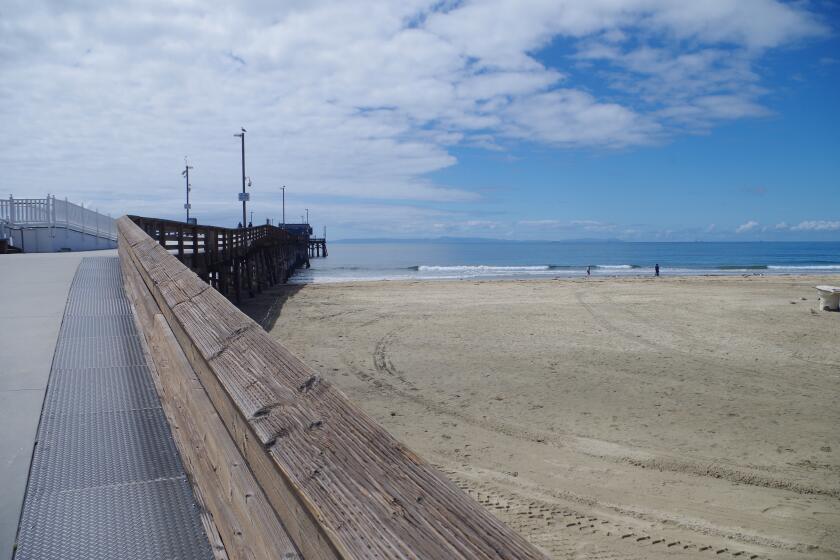Doctor aids Pakistani earthquake victims
- Share via
A Newport physician provides critical care in an area ravaged by quake, which killed as many as 100,000.Last month, Salman Naqvi spent eight harrowing days in northwestern Pakistan, living in a tent and treating hundreds of victims of the recent earthquake. During that time, the pulmonary and critical-care physician performed nearly every medical service imaginable -- delivering babies, treating wounds, providing drugs, even amputating limbs.
Naqvi, a Pakistani by birth, is back in his comfortable Newport Beach office now. But he’ll be heading back to Pakistan in December -- and, indeed, part of him never really left.
“Since I’ve come back, I’m basically obsessed with the earthquake victims,” said Naqvi, 43, who lives in Irvine. “It’s difficult to sleep at night.”
On Oct. 8, a 7.8-magnitude earthquake struck the northern region of Pakistan, near the borders of Afghanistan and India. The earthquake, said to be the worst to shake the area in the last century, killed as many as 100,000 people and leveled houses, schools and hospitals throughout the country.
In the wake of the tragedy, Relief International, a Los Angeles-based humanitarian group, began assembling teams of doctors to fly to Pakistan to aid the victims. Naqvi received an invitation from another Pakistani doctor in California, who told him he had two days to prepare before the flight. Taking a deep breath, Naqvi gathered a sleeping bag and warm clothes and flew out on Oct. 15.
“After the earthquake, we were seeing all this footage on different video channels,” Naqvi said. “It was kind of a desperate feeling. I wanted to do something, but I didn’t know what to do.”
The American team that landed in South Asia the second week of October consisted of four Pakistani-born doctors -- the other three were from San Francisco, San Diego and Whittier -- and a senior program officer from Relief International. At the disaster site, they were joined by crews from France, Lithuania, Japan and elsewhere, but each doctor’s services were nonetheless spread thin.
“We had to let people know that even if they had specialties, they may be doing everything from primary care to emergency medicine,” said Jennifer Norris, a public relations officer for Relief International.
When Naqvi’s group reached the town of Battagram, aid workers had set up medical tents amid the wreckage of the old hospital. Doctors slept in the same tents in which they treated patients, with electricity routed to them from nearby abandoned buildings. With steady streams of evacuees walking in from nearby towns, doctors handled between 200 and 300 patients a day, Naqvi said.
Sometimes, they couldn’t quite handle them. One of the most traumatic moments for Naqvi came when a 10-year-old boy died in his tent because the aid workers could not provide him with oxygen.
“We tried our best, but the boy just drifted away,” Naqvi said. “I had to tell the mother and father there was nothing I could do.”
At other times, the Pakistani army airlifted patients to larger cities if the aid workers in Battagram lacked the proper supplies. Complicating the situation was the gathering October cold, which caused a number of earthquake victims to come down with pneumonia.
When Naqvi returns to Pakistan in December -- together with his wife Farzana, also a doctor -- he expects to treat fewer wounds and more illnesses. Already, Save the Children and other relief agencies are scrambling to send tents, blankets and other supplies for the winter.
Naqvi, however, is not waiting a month to continue fighting for his native country. On Sunday, he will host a fundraiser at the Double Tree Hotel in Santa Ana to help raise money to rebuild a village in northern Pakistan. The event, which includes dinner and a silent auction of paintings, will feature presentations by Naqvi, the counsel general of Pakistan and others.
Meanwhile, another team from Relief International has flown into Pakistan and is continuing the work in the tents. Norris said Relief International, which also offered aid after the 2003 earthquake in Iran, often has repeat volunteers.
“A lot of it is word of mouth,” she said. “These doctors have come back so passionate about what they’ve seen.”
Apart from offering humanitarian assistance, Naqvi was passionate about one other thing in Pakistan: political relations. During his eight days of volunteering, he worked with a number of poor Pakistanis who had grown up resenting the United States and ultimately allowed their prejudices to dissipate.
“Before the earthquake, America was perceived as a country that’s invading other countries and trying to occupy,” Naqvi said. “But after the earthquakes, when the United States started coming in with helicopters, the perception has changed. It’s not bombs coming down -- it’s help, food, tents.
“That’s the best thing that can happen. You’re changing perceptions over there.”20051101ip94xmknDON LEACH / DAILY PILOT(LA)Dr. Salman Naqvi, a Newport Beach physician, discusses a recent trip to his native Pakistan, where he cared for survivors of the Oct. 8 earthquake. He plans to return to the quake zone in December.
All the latest on Orange County from Orange County.
Get our free TimesOC newsletter.
You may occasionally receive promotional content from the Daily Pilot.



